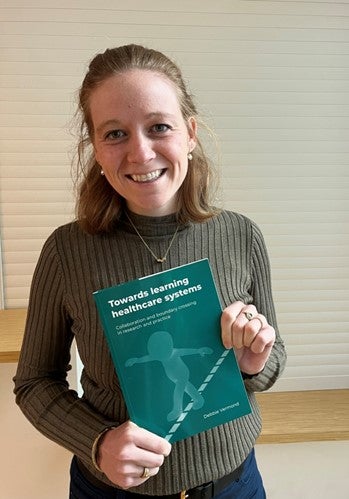“Towards learning healthcare systems – collaboration and boundary crossing in research and practice”
The complex balance between scientific knowledge of researchers, clinical expertise of doctors, and patient experience makes healthcare systems susceptible to inefficiency and fragmentation. This prompted us to build a healthcare system that aligns the input of researchers, healthcare professionals and patients: a learning healthcare system (Learning Healthcare System, LHS). This requires a multidisciplinary approach that focuses on researchers, doctors and patients.
The first part of this dissertation focuses on examining the role of researchers within the healthcare system. By means of a social network analysis (SNA), we explore who researchers collaborate with, how they collaborate and why they enter into certain collaborations. This analysis sheds light on the dynamics of research networks and how they contribute to the generation and dissemination of scientific knowledge.
The second part of this dissertation focuses on the role of healthcare professionals and patients in the healthcare system. We use cultural-historical activity theory (CHAT) to investigate how collaboration works in clinical practice. This approach allows us to understand the social and cultural context within which healthcare providers and patients interact, and to analyze the complex dynamics of clinical decision making.
In this second part, a regional transmural care database was developed to monitor collaboration between healthcare professionals in general practices and hospitals. In this database, routine care data from general practices and hospitals were linked, allowing improvement initiatives within the learning healthcare system to be supported. One of these improvement initiatives is the optimal care table: a place where healthcare professionals and patients engage in constructive discussions about their mutual cooperation and wishes for improvement. Two key elements to make such improvement initiatives a success: exposing contradictions and active participation of patients.
In short, to promote a learning healthcare system, a shift to a network-oriented approach is necessary. Investing in healthcare and research networks is of great importance, where strong connections are created between researchers, healthcare professionals and patients. These connections promote the free flow of knowledge and experience, leading to new insights and improvements in healthcare. To shape the healthcare system of the future, we must embrace the power of working together and learning together.

Link to flipbook thesis
